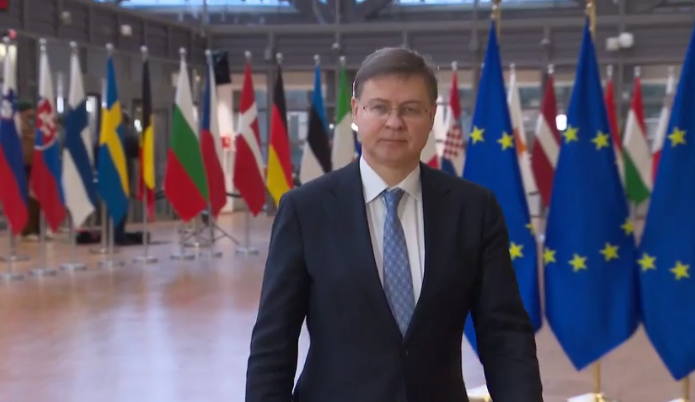Brussels – The US as a partner and a friend. Some in Europe hope for this; some still believe in it. What is certain is that the arrival (or return) of Donald Trump to the White House has been announced through proclamations, social media messages, and whatever the Republican party figure could produce. However, it seems that not everyone in the EU understood this. Economy Commissioner Valdis Dombrovskis provided his interpretation.
“The European Union and the United States are strategic partners,” he said during the Ecofin Council proceedings. “It is important to work together as Western democracies, especially in a context of technocratic regimes that seek to challenge the international rules-based system.”
Dombrovskis’s speech turns out to be a mix of conditions that do not respond to the reality of the facts, starting with the end. The first to the rules-based international system is the United States. Trump announced his plan to abandon the World Health Organization (WHO), and by calling into question a UN agency, one calls into question the entire UN and an entire international order with its rules.

Still, the presence of X’s patron, Elon Musk, within Trump’s team and his activism in an anti-EU sense are there to make it clear that the current US administration does not want the EU’s rules, starting with the Digital Services Act (DSA), the legislative package that, along with the Digital Markets Act (DMA), regulate online platforms — from marketplaces to social networks. Furthermore, the announcement to disregard the Paris Climate Accord and drilling policy to support fossil sources in defiance of the green economy is another message to the EU: the Green Deal and sustainability are a closed chapter.
All this alone would be enough to say that Dombrovskis seems not to have understood what is happening or probably does not have the strength to acknowledge it publicly. Is the United States still a partner? It remains to be seen, but the signs lean toward ‘no.’ Does the United States still see the European Union as a partner and, even more so, a strategic one? Again, the answer is more ‘no’ than ‘yes.’
Dombrovskis points the finger at technocratic regimes. One must then question for a moment what a technocracy is. It is the end of politics. It is a collection of managers who go from running their respective companies to running a country like a business. From this point of view, the United States has never been a democracy that clearly separated the two planes. At best, it is a country where politics governed on behalf of entrepreneurs; now, entrepreneurs are politics. Trump himself is a businessman, as is Musk – tasked with working on cutting government spending – and as is Scott Bessent – slated for the role of US Treasury Secretary – who, before his political adventure, led a private investment fund. Then there is Howard Lutnik, chairman and CEO of Cantor Fitzgerald and BGC Group, a financial services company. He is vying for the post of Secretary of Commerce.
The list of wealthy businessmen in politics in Trump’s America does not end there. Linda McMahon, nominated for Secretary of Education, founded and ran World Wrestling Entertainment (WWE) with her husband. Chris Wright, nominated for Secretary of Energy, was president of Liberty Energy, one of Colorado’s largest oil companies. In short, the world’s largest technocracy is what Dombrovskis considers a friendly democracy.
In this context, European Commission President Ursula von der Leyen is right to look for alternatives to the United States. Considering the doubts about Trump with a thousand question marks, welcome India and China.
English version by the Translation Service of Withub





